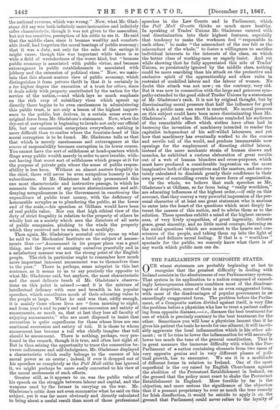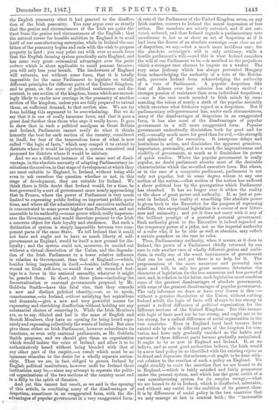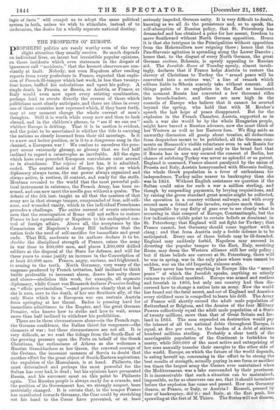THE P ARMAMENTS OF COMPOSITE STATES.
OT.Tht wisest statesmen are probably beginning at last to. recognize that the greatest difficulty in dealing with Ireland consists in the absoluteness of our Parliamentary system.. That system in its application to a nation composed of exceed- ingly heterogeneous elements combines most of the disadvan- tages of despotism, some of them in an even exaggerated form, with most of the disadvantages of popular government in- an exceedingly exaggerated form. The problem before the Parlia- ment, of a Composite nation divided against itself, is very like• the problem before a physician who has to treat a patient suffer- ing from opposite diseases,—i.e., diseases the best treatment for one of which is precisely contrary to the best treatment for the• other. Sometimes you will hear a physician lament that if he- gives his patient the tonic he needs for one ailment, it will inevit- ably aggravate the local inflammation which is his other ail- ment ; or if he tries to lower the inflammation he will assuredly lower too much the tone of the general constitution. That is- in great measure the immense difficulty with which the Par- Parliament of a nation containing elements from two races of very opposite genius and in very different phases of poli- tical growth, has to encounter. We see it in a multitude- of different forms in relation to Ireland. One of the most superficial is the cry raised by English Churchmen against the abolition of the Protestant Establishment in Ireland, on the ground that the policy must react to shake the Protestant Establishment in England. More forcible by far is the objection, and more serious the significance of the objection that if a peasant proprietary be ever so much the true remedy for Irish disaffection, it would be suicide to apply it on the ground that Parliament could never refuse to the loyalty of the English peasantry what it had granted to the disaffec- tion of the Irish peasantry. You may argue ever so stoutly that the genius and circumstances of the Irish are quite dis- tinct from the genius and circumstances of the English ; that the natural career for humble ambition in England is to avail itself of our manufacturing enterprise, while in Ireland the am- bition of the peasantry begins and ends with the wish to propose property in land ; you may point out with ever so much force that the English farming system practically snits England, and has Borne very great • ecbnomical advantages over the petite culture which is alone applicable to small peasant farmers ; you will only lose your breath. The landowners of England will reiterate, not without some force, that it is totally impossible for the same Parliament to legislate on totally different principles for different parts of the United Kingdom, and to grant, on the score of political restlessness and dis- content, to one section of the kingdom, boons which are exceed- ingly likely to excite new cravings in the peasantry of another section of the kingdom, unless you are fully prepared to extend them, on sufficient demand, to that section also. We are far from holding this argument to be overwhelming. But we do say that it is one of really immense force, and that it goes a great deal further than those who urge it really know. It goes to show that in such a political amalgam as Great Britain and Ireland, Parliament cannot really do what it thinks honestly the best for each section of the country, considered in itself, for fear of the tremendous force of what is now called " the logic of facts," which may compel it to extend to districts where it would be injurious, a system conceived and proposed for districts where it would be salutary.
And we see a different instance of the same sort of disad- vantage, in the absolute necessity of adapting Parliamentary in- stitutions themselves, in that stage of development atwhich they are most suitable to England, to Ireland, without being able even to ask ourselves the question whether or not, in this stage of development, they are suitable for Ireland. We think there is little doubt that Ireland would, for a time, be best governed by a sort of government more nearly approaching that in France, where the power of Parliament is very much limited to expressing public feeling on important public ques- tions, and where all the administrative and executive authority is concentrated in some power higher than Parliament, and not amenable to its authority,—some power which really imperson- ates the Government, and would therefore present to the Irish a concrete object for their loyalty and obedience. But such a distinction of system is simply impossible between two com- ponent parts of the same State. To tell Ireland that it could not have and ought not to have as much liberty of self- government as England, would be itself a new ground for dis- loyalty ; and the system could not, moreover, be carried out without a virtual dissolution of the Union, and the degrada- tion of the Irish Parliament to a lower . relative influence in relation to Government, than that of England :—which, besides being impossible in itself,—besides inflicting a new wound on Irish self-love, — would draw all wounded feel- ings to a focus in the national assembly, whatever it might be, granted them. In short, all these plans—including the decentralization or cantonal governments proposed by Mr. Goldwin Smith—have this fatal vice, that they concede a new and distinct political identity,—or, so to speak, consciousness,—to Ireland, without satisfying her aspirations and demands,—give a new and very powerful means for expressing and cherishing disaffection without holding out any substantial chance of removing it. While the Irish Members are, so to say, diluted and lost in the mass of English and Scotch Members, they have no opening for being heard sepa- ratelyand expressing collectively the wants of Ireland. But once give them either an Irish Parliament, however subordinate its functions, or even only cantonal parliaments, as Mr. Goldwin Smith proposes, and we should give them an organization which would isolate the voice of Ireland, and allow it to be authoritatively heard without being blended with that of any other part of the empire,—a result whiCh must be an immense stimulus to the desire for a wholly separate nation- ality. Thus we are, in fact, obliged to govern Ireland by English political institutions, however unfit for Ireland these institutions may be,—since any attempt to separate the politi- cal organizations of the two sections of the country must end in a fillip to the spirit of disunion.
And yet this cannot but result, as we said in the opening of this article, in combining many of the disadvantages of despotism, sometimes in an exaggerated form, with the dis- advantages of popular government in a very exaggerated form. A vote of the Parliament of the United Kingdom never, on any Irish matter, conveys to Ireland the moral impression of free action. Her members are utterly outvoted, and if not out- voted, seduced, and thus Ireland regards a parliamentary vote unwelcome to her as as sheer an act of despotism as if it had been the decree of an absolute sovereign :—as sheer an act of despotism, we say,—but a much more invidious one ; for the absolute sovereign's will is only arbitrary, while a hostile parliament's will,—and this is what Ireland considers the will of our Parliament to be,—is ascribed to the prejudices which a stronger race chooses to impose on a weaker. The very same jealousy which has always prevented Hungary from acknowledging the authority of a vote of the Reichs- rath, prevents Ireland from acknowledging the authority of a vote of Parliament. A popular despotism like that of Athens over her colonies has always excited a stronger passion of resistance than even individual despotism ; —nor is the case much mended to Irish minds by com- manding the voices of nearly a sixth of the popular assembly which exercises what Irishmen regard as a despotism. But if parliamentary self-government has, under such circumstances, many of the disadvantages of despotism in an exaggerated form, it has also most of the disadvantages of popular government in a still more exaggerated form. Popular government undoubtedly diminishes, both for good and for evil,—usually much more for good than for evil—the strength and splendour of the executive. It interposes delays and hesitations in action, and diminishes the apparent grandeur, importance, personality, and in a word, the impressiveness and visibility of government, as much as it diminishes its power of quick resolve. Where the popular government is really popular, no doubt parliament absorbs most of the desirable characteristics which the so-called executive loses. But where, as in the case of a composite parliament, parliament is not only not popular, but in some degree odious to any one section of the nation,—that section of the nation has suffered a sheer political loss by the prerogatives which Parliament has absorbed. It has no longer over it either the reality or the show of great power and authority. If, as just at pre- sent in Ireland, the reality of something like absolute power is given back to the Executive for the purpose of repressing rebellion, this exceptional legislation is a source of new bitter- ness and animosity ; and yet it does not carry with it any of the brilliant prestige of a powerful personal government. Such authority given to the Executive is indeed regarded as the temporary power of a jailer, not as the imperial authority of a ruler who, if he be able as well as absolute, may reflect a certain grandeur on the race he rules.
Thus, Parliamentary authority, when it means, as it does in Ireland, the power of a Parliament chiefly returned by one race to rule another race of wholly different genius and ambi- tions, is really one of the worst instruments of government that can be used, and yet there is no help for it. The prepossessions of the more numerous and powerful race must and will, in only too great measure, determine the character of legislation for the less numerous and less powerful race, and, in relation to the latter, such legislation must combine some of the greatest disadvantages of absolute government, with some of the greatest disadvantages of popular government. The only inference we draw or have ever drawn is this :- without a genuine dissolution of the Union, without cutting Ireland adrift, the logic of facts will always be too strong to permit a radical difference of political organization for the different sections of the United Kingdom. But this inexor- able logic of facts need not be too strong, and ought not to be too strong, for a radical difference of social organization in the two countries. Even in England local land tenures have existed side by side in different parts of the kingdom for cen- turies, and have only gradually vanished as the habits and customs of these different parts became gradually assimilated. It ought to be so now in England and Ireland. If, as we believe, and as most good authorities believe, the Irish would by a new land policy be so identified with the existing re'gime as to dread and deprecate disturbance,—it ought to be done with- out relation to the reaction of such a policy on England. We ought steadily to resist the assertion that we are bound to do in England,—which is fairly satisfied and fairly prosperous under the present system, and which has the great outlet of a vast manufacturing system for its surplus energy,—what we are bound to do in Ireland, which is disaffected, miserable, and without any outlet for the ambition of its poorest class. It is by differences of social policy in the two countries that we may manage at last to content both ; the " inexorable logic of facts " will compel us to adopt the same political system in both, unless we wish to stimulate, instead of to undermine, the desire for a wholly separate national destiny.








































 Previous page
Previous page